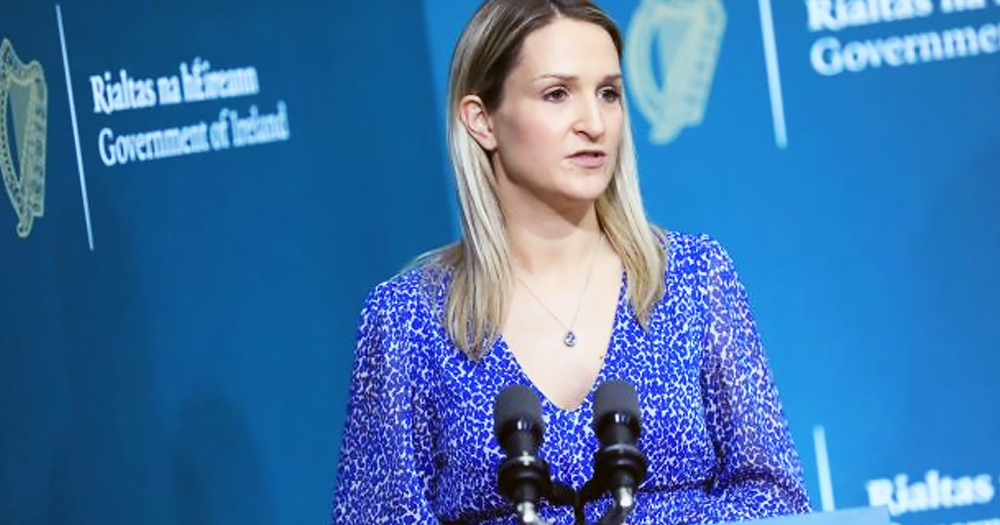The Government has plans to strengthen the current legislation against hate crimes and hate speech by introducing a new bill later this year. The aim is to protect marginalised groups against racist, homophobic and transphobic violence and to make it easier to secure convictions in courts.
On Wednesday, July 13, Minister for Justice Helen McEntee spoke to RTÉ radio and Newstalk about plans to amend her approach to the Incitement to Hatred and Hate Crime Bill, a new law that is currently in the final drafting process and is scheduled to be introduced in autumn this year.
Ireland currently has no legislation that protects citizens from hate crimes. In April this year, calls for the introduction of a hate crime law intensified following the homophobic murders of Aidan Moffitt and Michael Snee in Sligo.
The new Bill will introduce “aggravated” versions of existing criminal offences in cases in which such offences are motivated by prejudice against a victim’s “protected characteristic”. The “protected characteristics” accounted for in the new law will be: race, colour, nationality, ethnic or national origin, sexual orientation, gender (which will also include gender identity and expression) and disability.
'We need a law that has teeth, that you can prosecute but we also need a law around hate crimes,' Minister for Justice Helen McEntee said as legislation to tackle hate speech and hate crime is planned for the autumn | Read more: https://t.co/cxJ6FZVgRM pic.twitter.com/SCEG6S8J0t
— RTÉ News (@rtenews) July 13, 2022
Moreover, the Bill will also update the hate speech provisions in the Prohibition of Incitement to Hatred Act 1989, creating new criminal offences to cover incitement of hatred also on all forms of media, including online and social media. While she made it clear that the law will contain safeguards for free speech and debate, McEntee said that she wants both hate crimes and incitement to commit violence to be prosecutable.
Minister McEntee also explained that the legislation will include a “demonstration test” in the prosecution of hate crimes in addition to the “motivation test”. This will change the way hate crimes are investigated and it was introduced because motivation alone is “difficult to establish and therefore might not result in a conviction”.
With the demonstration test, it will be sufficient that the perpetrator demonstrated prejudice towards their victim (for example, by using homophobic language at the moment of the attack) for the offence to be classified as a hate crime.
The NXF welcomes today's announcement that an enhanced Hate Crime law will be advanced in coming weeks.
This has long been a pressing priority for LGBT+ people – brought into even sharper focus with a surge in homophobic/transphobic hate attacks.
Crucially, it must have teeth. https://t.co/ebL8TnJagz
— NXF (@nxfie) July 13, 2022
“There are people living in this country at this moment in time who are not living their lives as they should simply because of fear,” McEntee said. “We all have a right to feel safe and to be safe. For somebody to feel unsafe simply because of who they are – their race, their religion, the colour of their skin, their sexual orientation – it’s not a society that I want to live in, and it’s not what we should be tolerating.”
Adam Long, NXF Board Director, welcomed today’s announcement with the following words: “The enactment of effective & enforceable Hate Crime legislation has long been a priority for the NXF and indeed the wider LGBT+ community as our ‘Burning Issues’ research revealed. The surge in homophobic hate attacks and even murders earlier this year brings the issue into even sharper focus. Tellingly, more recent research we commissioned earlier this year revealed strong public support for Hate Crime measures to protect the LGBT+ community at an overwhelming 90%.”
He added: “We have also been clear in all our engagements with Government and other political parties that the legislation cannot be merely symbolic but actually capable of robustly responding to the scourge of hate and hate crime. We therefore welcome the addition of a new ‘Demonstration’ clause and also the specific inclusion of online hate.”
© 2022 GCN (Gay Community News). All rights reserved.
Support GCN
GCN is a free, vital resource for Ireland’s LGBTQ+ community since 1988.
GCN is a trading name of National LGBT Federation CLG, a registered charity - Charity Number: 20034580.
GCN relies on the generous support of the community and allies to sustain the crucial work that we do. Producing GCN is costly, and, in an industry which has been hugely impacted by rising costs, we need your support to help sustain and grow this vital resource.
Supporting GCN for as little as €1.99 per month will help us continue our work as Ireland’s free, independent LGBTQ+ media.

comments. Please sign in to comment.